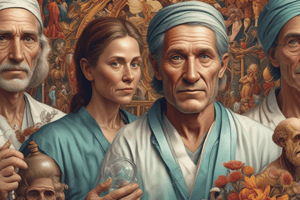Podcast
Questions and Answers
Which word in bold on this page best describes a high temperature, headache and a stuffy nose?
Which word in bold on this page best describes a high temperature, headache and a stuffy nose?
Symptoms
What illness might a patient with a high temperature, headache, and stuffy nose have?
What illness might a patient with a high temperature, headache, and stuffy nose have?
Cold or flu
What evidence might a doctor have found to diagnose a patient with acne?
What evidence might a doctor have found to diagnose a patient with acne?
Presence of pimples or skin lesions
Which of the following best describes the heart?
Which of the following best describes the heart?
State one job that the heart does.
State one job that the heart does.
What mnemonic is spelled out by the first letters of the life processes?
What mnemonic is spelled out by the first letters of the life processes?
What is one difference between how most animals move and how most plants move?
What is one difference between how most animals move and how most plants move?
What is one thing that many plants do to reproduce but animals do not?
What is one thing that many plants do to reproduce but animals do not?
Describe two ways in which you show sensitivity.
Describe two ways in which you show sensitivity.
What is one difference between how trees grow and how humans grow?
What is one difference between how trees grow and how humans grow?
What is one difference between how fish and humans get their oxygen?
What is one difference between how fish and humans get their oxygen?
In what ways is a car like an organism?
In what ways is a car like an organism?
Why is a car not an organism?
Why is a car not an organism?
Flashcards are hidden until you start studying
Study Notes
Doctors Past and Present
- Doctors have been examining patients for thousands of years.
- Ancient Egyptian doctors understood the importance of a beating heart.
- Modern medical tools and techniques are used to analyze the body and diagnose illnesses.
- Symptoms are changes in the body that indicate an illness.
- Ancient Egyptian instruments and medicines are still recognizable to modern doctors.
- Modern medical equipment allows doctors to visualize organs inside the body.
- The ancient Egyptians believed animal dung was a medicinal ingredient.
The Heart
- The heart is an organ.
- The heart pumps blood throughout the body.
What Do All Living Things Do?
- Ancient Egyptians believed in a "life force" called "ka".
- Modern understanding of life is based on observable processes.
- Living things: move, reproduce, sense, grow, respire, need nutrition, excrete waste.
Organism or Not an Organism
- Living things are also called organisms.
- Examples of organisms: cow, daffodil, goldfish, mouse, octopus, snake.
- Examples of non-organisms: car, chair, coal, rock, robot, the Sun.
Movement
- All living things exhibit movement, either in the whole body or individual parts.
Reproduction
- Reproduction is the process of creating offspring similar to the parent organism
Sensitivity
- Organisms react to stimuli in their environment.
Growth
- Living things increase in size.
- Humans grow throughout childhood but trees grow throughout their lifespan.
Respiration
- Living things use respiration to release energy.
- Fish obtain oxygen from the water, while humans breathe air.
Excretion
- Organisms produce waste materials.
Nutrition
- Organisms need various substances to sustain life.
Organs
- Ancient Egyptians viewed the heart as central to a person's being.
- The heart was left in the body during mummification while other organs were removed.
- The brain was not considered important in ancient Egyptian beliefs.
Studying That Suits You
Use AI to generate personalized quizzes and flashcards to suit your learning preferences.




